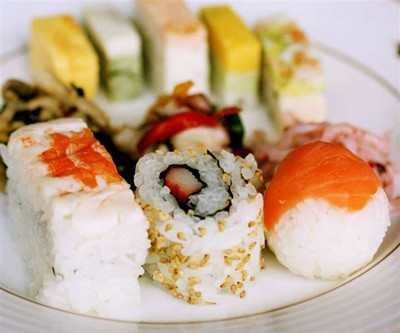Katie: So, we're talking about going local as we're in a different country. How much of the local culture do you absorb? How much, like local ... cause we both live in Japan right? How much in percentage for example? How much Japanese food would you say you eat?
凯蒂:我们现在在其他国家生活,我们来谈谈当地的生活吧。你吸收了多少当地的文化?我们现在都在日本生活,对吧?你吸收了百分之多少的日本文化?你对日本食物的接受程度如何?
Gilda: Oh, I would say probably like 80% of my food is Japanese food. Yeah, I like it because most of it is healthy and it's actually like what I can get in the cafeteria at work so ...
吉尔达:哦,目前我的饮食中,80%都是日本食物。我喜欢日本食物,因为大多数日本食物很健康,而且我公司的自助餐厅可以买到……
Katie: That's convenient.
凯蒂:很方便。
Gilda: It's convenient. What about you?
吉尔达:很方便。你呢?
Katie: I mostly make my own food, and Japanese food is really difficult to make I think. I'm really challenged when it comes to cooking anyway. I'm really bad a cooking. And to have to try to learn a new style of cooking is just too much for me. I'm really lazy. So I would probably say if I'm cooking food myself, I never cook Japanese food. Zero percent of the time. I never, but if I go to a restaurant then sure, I can eat Japanese food sometimes.
凯蒂:我基本上是自己做饭吃,我认为日本食物很难做。就烹饪来说,那对我来说是一种挑战。我做得不太好。对我来说,学习新的烹饪方式太难了。我很懒。所以如果我自己做饭吃,我不会做日本菜。我一次都没做过日本菜。不过如果去餐厅吃饭,那我有时会吃日本菜。
Gilda: I sometimes watch the TV and learn how to cook Japanese food. There's some easy recipes. Do you ever watch that - Japanese television?
吉尔达:我有时会看电视学做日本菜。有一些简单的食谱。你看过日本电视台的节目吗?
Katie: I try, but like you said there's a lot of cooking programs
凯蒂:我试过,不过就像你说的,有很多美食节目。
Gilda: That's what I was about to say, there's tons of cooking TV shows, programs.
吉尔达:这就是我要说的,日本有很多烹饪节目。
Katie: And I watch cooking programs and I just get angry that I can't cook! I can't do it like that so I get frustrated, so I stop watching.
凯蒂:我看烹饪节目时会生气,因为我做不了!我不能像电视里那样做饭,所以我会很沮丧,然后我就不再看烹饪节目了。
Gilda: Yeah, I see.
吉尔达:我明白了。
Katie: What about other kinds of shows? Like, not just cooking shows?
凯蒂:那其他节目呢?除了烹饪节目以外的其他节目呢?
Gilda: Well, they have, I guess they have pretty funny shows, but I don't understand what they're saying, but I try to follow them, and yeah, sometimes they are very interesting. They also talk about the clothing season, what's trending in Japan. What young would people would do, and they have some interviews sometimes, and they're always teaching you something, so that's something I like about Japanese TV, you always learn something, from other countries as well. That's true.
吉尔达:日本有很多喜剧节目,虽然我不太明白他们在说什么,不过我尽量去理解,有时节目非常有意思。他们还会谈论应季服装和日本的流行趋势。还有年轻人会做什么,他们有时会有采访环节,教你一些事情,所以我喜欢日本节目,因为你能学到东西,从其他国家也可以学到东西。这是真的。
Katie: That's true. So how about your friendship circle? How much percent of your friends would you say are Japanese versus International?
凯蒂:没错。那你的朋友圈呢?在你的朋友中,日本人和外国人的比例是多少?
Gilda: Oh, I would say probably 40% are Japanese. Yeah, the rest of them are international people cause I work with intenational people, so I spend most of the time with them.
吉尔达:哦,可能我的朋友中有40%是日本人。其他都是外国人,因为我在工作中和外国人打交道,所以我大部分时间都和他们接触。
Katie: And when you're with your Japanese friends, so you speak mostly in English, or mostly in Japanese?
凯蒂:你和日本朋友在一起时,是说英语还是说日语?
Gilda: Oh, I would say like probably 70% Japanese and the rest would be English because normally when they know a second language, it's English not Spanish, so I like zero percent Spanish, a lot of Japanese, but yeah like I would say 70% of the conversation is in Japanese also because I want to practice my Japanese.
吉尔达:哦,可能对话的70%在说日语,其他时间说英语,因为通常他们都会第二语言,不是英语就是西班牙语,我在和他们交谈时不喜欢说西班牙语,尽量说日语,可能对话时有70%在说日语,因为我想练习日语。
Katie: Right.
凯蒂:好。
Gilda: What about you?
吉尔达:你呢?
Katie: Well, I would say out of my friends, recently, I've had like no time to socialize, so probably like 30% of my friends are Japanese, but when I speak with them it's mostly in Japanese. I don't like speaking in English. For me, for the same reasons as you, like, I want to practice my Japanese
凯蒂:我最近不常和朋友见面。我没有时间和朋友交流,我的朋友中大概有30%是日本人,我和他们聊天时基本上用日语。我不喜欢在对话时说英语。我和你一样,我也想练习日语。
Gilda: But I would say that from my Japanese friends, like most of them, probably like 80% of them always want to speak in English because they want to practice English too, so it's like a give-and-take, like we speak a little bit in Japanese, but sometimes we speak more in English. It depends also the topic and what you're talking about.
吉尔达:不过我的日本朋友,大概有80%想说英语,因为他们也想练习英语,这就像互相迁就,我们说一点儿日语,有时会多说些英语。这取决于所谈论的话题。
Katie: If it's a topic you can talk about, then, yeah, go for it in Japanese, but if it's a difficult topic...
凯蒂:如果是你可以谈论的话题,那就用日语表达看法,如果是一个很难的话题……
Gilda: Yes, exactly, yeah!
吉尔达:对,没错,就是这样!

译文属可可原创,仅供学习交流使用,未经许可请勿转载













